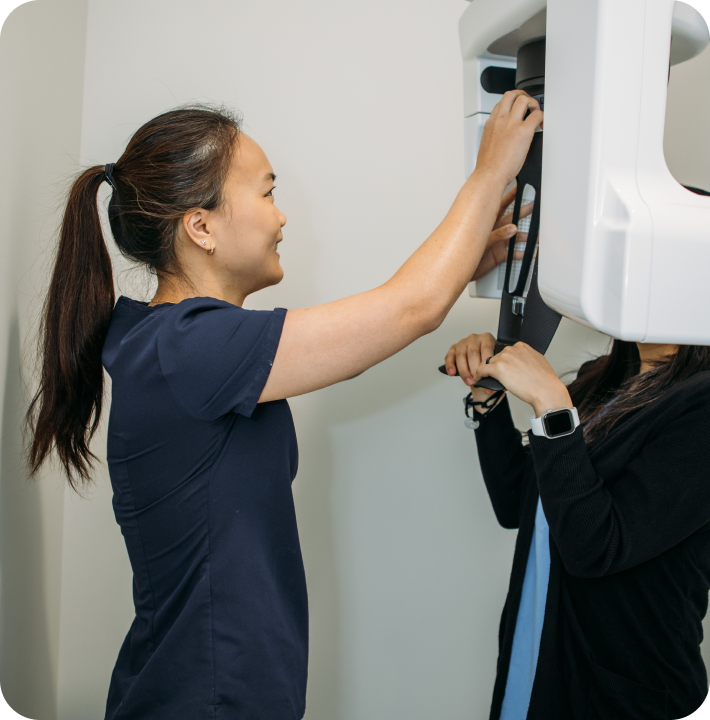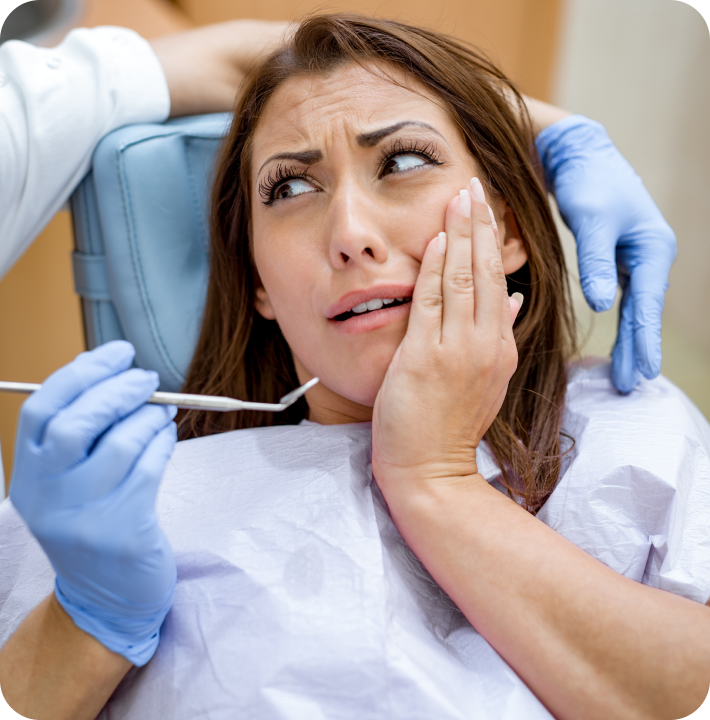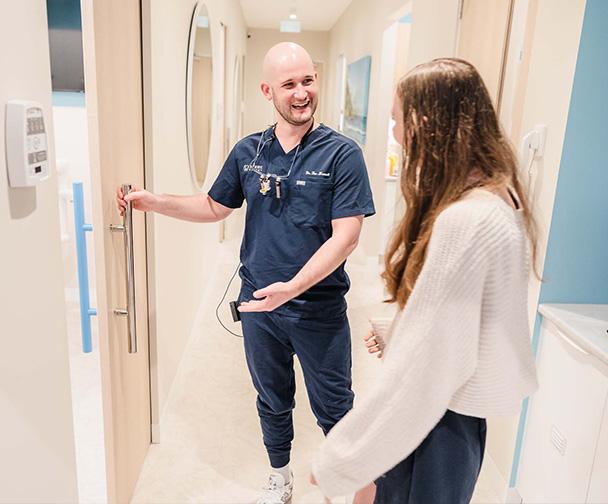Receive Prompt Dental Care From Your Trusted Emergency Dentist
At Azure Dental, our emergency dentist provides professional care for urgent dental issues, offering relief and focused attention when you need it most.

We Deliver Timely Care For Urgent Dental Issues With Focused Treatment Approaches
Facing a dental emergency can be stressful and overwhelming. The pain and uncertainty can make the situation even more complicated, whether it’s a sudden toothache, infection, or dental injury. It’s essential to act quickly to avoid further complications.
Our team at Azure Dental Inglewood understands this urgency. We provide timely, focused care that addresses the problem immediately. By prioritising your comfort and dental health, we aim to relieve pain and restore your peace of mind without delay.

Candidate Requirements For Receiving Emergency Dental Care
Emergency dental care is designed for individuals with urgent oral health issues that need immediate attention. These patients often experience severe pain or dental injuries.
- Patients experiencing intense tooth pain or discomfort requiring urgent relief are ideal candidates for emergency dental care.
- Individuals with visible swelling, abscesses, or other signs of infection may need emergency care to prevent the problem from worsening.
- People who have suffered dental trauma, such as knocked-out or broken teeth, should seek immediate attention.
- Patients with lost fillings, crowns, or other restorations should receive prompt care to avoid further complications or damage.
Explore the Benefits of Immediate Care From an Emergency Dentist
Immediate care from an emergency dentist helps address urgent dental issues quickly, providing relief and preventing further complications. Here are some key benefits of seeking emergency care:
- Quick action relieves severe pain, allowing patients to resume daily activities with comfort and avoid prolonged discomfort.
- Timely intervention stops infections from spreading and causing more serious oral health problems over time.
- Emergency care preserves natural teeth that might otherwise be lost or compromised, maintaining your healthy smile.
- Immediate treatment reduces the need for invasive, costly procedures later, protecting your long-term oral health and comfort.

Emergency Dentistry Services
Our emergency dental services are designed to provide quick and effective care when urgent dental issues arise.
Schedule Your Consultation Today
Experience Exceptional Dental Treatments for a Healthier, Brighter Smile

Frequently Asked Questions
Our FAQs section provides essential information about emergency dental care, answers common questions and offers guidance for urgent dental issues.
What constitutes a dental emergency?
A dental emergency involves urgent dental care needs that must be addressed quickly to prevent further complications. Here are some common dental emergencies:
- Severe toothache:
This type of pain can be sudden and unbearable, often signalling decay or infection, and needs immediate attention to relieve discomfort. - Knocked-out tooth:
If a tooth is completely knocked out, it should be placed in milk or tap water, and urgent care should be sought to increase the chance of preserving it or preventing complications. - Broken tooth:
A broken or cracked tooth can lead to the exposure of its inner parts, leading to pain and infection. This requires prompt care to avoid worsening the damage. - Injury to gums or mouth:
Sudden trauma to the gums, teeth, or inside of the mouth from accidents or impact needs immediate evaluation to prevent further harm.
Quick action and emergency dental treatment can help maintain oral health in each of these cases.
What should I do if I have a knocked-out tooth?
Acting quickly and remaining calm is essential if an adult tooth is knocked out. Ideally, you should see a dentist within 30 minutes to increase the chances of restoring the tooth. Follow these steps:
- Find the tooth:
Pick it up by the crown (the part visible in the mouth), avoiding the root to prevent damaging delicate tissue needed for reattachment. - Rinse with milk or saline:
If the tooth is dirty, gently rinse it with milk or saline. Do not scrub it, as this could remove tissues vital for reattachment. - Reinsert the tooth:
Place the tooth back into the socket if possible. Gently bite down on a soft cloth or tissue to hold the tooth in place until you reach a dentist. - Transport the tooth if reinsertion isn’t possible:
If reinserting the tooth is not feasible, keep it in a container of milk or the person’s saliva. Alternatively, you can place it between the teeth and cheek, being careful not to swallow it. - Avoid water and dry storage:
Never store the tooth in water or wrap it in a dry cloth or tissue, as this can damage the tooth.
Seeking emergency dental treatment quickly improves the chances of preserving your natural teeth and can help prevent further complications from tooth injuries. Acting fast also helps ease dental pain and leads to better overall outcomes.
How quickly should I seek treatment for a broken tooth?
If you experience a severe toothache, it could be a sign of a more serious issue, and immediate action is needed. Depending on the level of pain, the situation may qualify as a dental emergency.
Follow these steps:
- Rinse your mouth:
Begin by using warm water to rinse your mouth and clear the area, getting rid of any food particles that could be causing irritation. Maintaining a clean mouth is crucial for good oral hygiene. - Assess the pain:
If you’re dealing with excruciating pain or unbearable pain, contact dental emergency services immediately. Toothaches can escalate quickly, and you don’t want to risk further complications. - Look for swelling:
Swelling around the tooth or face can indicate an infection. In such cases, you may need an emergency dental procedure to address the problem and provide relief. - Apply a cold compress:
If swelling, you can apply a cold compress to the outside of your mouth to help reduce the discomfort while you wait for your appointment.
A dental emergency like this requires prompt attention to prevent further issues. Azure Dental provides affordable, urgent oral care for those in need.
Can a severe toothache be considered a dental emergency?
A dental emergency may arise from a severe toothache, as it may indicate an infection or injuries to teeth that require immediate care. While over-the-counter pain medication can offer temporary relief, seeking quality dental treatment as soon as possible is essential.
A dentist will assess your condition and create an individualised dental treatment plan to address the pain and the underlying issue. Preventative care is also essential to help avoid future dental emergencies.
What steps should I take if I experience sudden dental trauma?
You should seek emergency dental service for a broken tooth as soon as possible. Ideally, you should see a dentist within 24 to 48 hours of breaking the tooth. Here are some reasons for seeking prompt care:
- Pain Relief:
A broken tooth can expose the inner layers of the tooth, leading to sensitivity or severe pain. Immediate treatment can alleviate discomfort. - Prevent Infection:
A crack or break can allow bacteria to enter the tooth, increasing the risk of infection or abscess. Early treatment can prevent this. - Preserve Tooth Structure:
Addressing a broken tooth quickly can increase the chances of saving it. Delays might lead to further damage, requiring more extensive procedures like a root canal treatment or extraction.
Are emergency dental services available after hours or on weekends?
Yes, emergency dental services are available to accommodate urgent needs. The clinic is open Monday through Friday from 9 a.m. to 5:30 p.m., with extended hours on Thursdays until 8 p.m. Saturday appointments are available from 9 a.m. to 1 p.m., offering convenient options for those needing care outside regular hours.
For cases of extreme pain, injuries to teeth, or other urgent dental issues, these extended hours allow for timely emergency dental treatment. Addressing emergencies promptly helps manage pain and protect oral health, preventing complications and maintaining a healthy mouth.
What should I do if I have a loose filling or crown?
If you have a loose filling or crown, acting promptly is essential to protecting the tooth. Here’s what you should do:
- Remove the loose piece:
If a filling or a crown has completely fallen out, keep it safe and bring it with you to your appointment. Avoid chewing on the side where the involved tooth is to prevent further damage. - Rinse your mouth:
Use warm water to gently rinse the area, keeping it clean and reducing the risk of infection. - Visit the dentist:
Schedule an appointment for an evaluation. A dentist will assess the tooth’s condition and determine the appropriate course of action, possibly replacing the crown or filling. - Avoid certain foods:
Until you see the dentist, avoid hard or sticky foods that can cause additional discomfort or worsen the situation.
Receiving prompt care will help restore the tooth and prevent complications from worsening.
Can emergency dentists help with gum or mouth injuries?
Yes, an emergency dentist can effectively address injuries to the gums or mouth. When you visit the dentist with such an injury, they will assess the damage by checking for bleeding, swelling, and any trauma to the soft tissues. The dentist will also clean the area and remove any debris to reduce the risk of infection.
If there is significant bleeding, they will take steps to manage it, using special materials or sutures if necessary. Depending on the severity of the injury, they may also provide medications to manage pain or prevent infection. A follow-up visit will be recommended as part of your care if needed.
Emergency dentists aim to address the injury quickly and thoroughly to promote healing and prevent further complications.
What happens during an emergency dental visit?
The dentist will evaluate your condition during an emergency dental visit and provide immediate care. Here’s what typically happens:
- Evaluation of the issue:
The dentist will carefully examine the area affected by the emergency, such as a toothache or injury, to understand the situation and what treatment is needed. - Pain management:
If you’re experiencing extreme pain or unbearable pain, the dentist will prioritise pain relief using medication or other methods. - Treatment or temporary care:
Depending on the problem, the dentist may offer temporary care, such as stabilising a tooth or replacing a filling, until further treatment can be arranged. - Creation of a dental treatment plan:
After addressing the immediate concern, the dentist will develop a dental treatment plan to further address the issue and help maintain your oral health fully.
This visit focuses on providing immediate relief and planning for further care to keep your teeth and gums healthy.
How can I prevent dental emergencies from occurring in the future?
Preventing dental emergencies often includes regular preventative care and good oral hygiene habits. Here are some ways to help reduce the risk of dental emergencies:
- Maintain regular dental check-ups:
Regular visits to the dentist can help catch potential problems early before they become emergencies. This includes routine cleanings and exams to monitor oral care and overall dental health. - Practice good oral hygiene:
Brushing twice daily, flossing, and using mouthwash can help keep your mouth clean and prevent issues like cavities, gum disease, and infections that could lead to a dental emergency. - Avoid hard foods:
Biting into hard foods, like ice or hard candy, can lead to injuries to teeth, such as cracks or chips. Being mindful of what you eat helps protect your teeth. - Use a mouthguard:
If you play sports or engage in physical activities, wearing a mouthguard can help protect your teeth from sudden trauma or injury. - Address dental issues promptly:
Don’t ignore issues like a loose filling or mild pain. Early treatment can prevent them from becoming more problematic and requiring emergency dental services.
Following these steps can lower your chances of experiencing a dental emergency and keep your teeth in good health.




